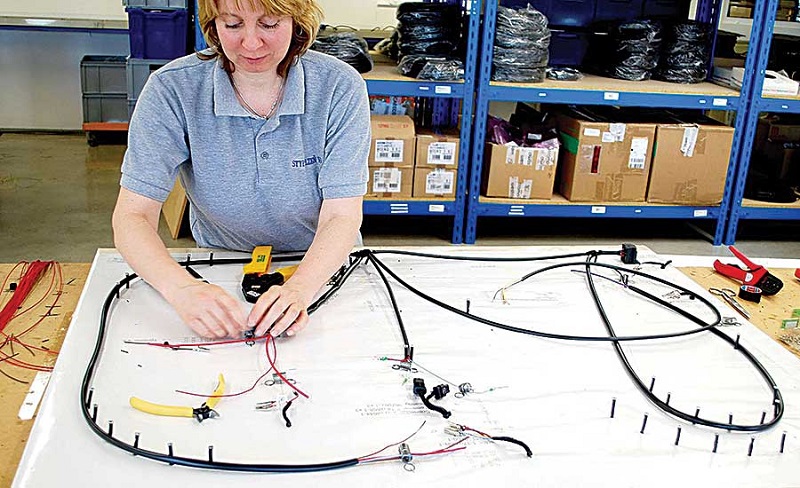Why Join IPC 620 Training and Certification Program

There has a well-respected certification program for those working with cable and wire harnesses called IPC-A-620. The Association of Connecting Electronics Industries (IPC), a global trade association for the electronics manufacturing industry, maintains this standard. The requirements for producing, assembling, and testing cable and wire harness assemblies are in the IPC-A-620 standard. This essay will focus on the IPC 620 certification program and its significance in electronics.
Introduction to IPC-A-620 Certification Program
Individuals engaged in fabricating, installing, and inspecting cable and wire harnesses are the target audience for the IPC-A-620 certification program. It ensures that products meet legal requirements and customer expectations for the cable and wire harness assembly sector, becoming the standard against which all others are judged.
This extensive course covers various areas of knowledge, including wire stripping, soldering, crimping, mounting connections, and testing techniques. Electronics employers greatly respect professionals who have acquired their IPC 620 certification since it attests to their cable and wire harness assembly competence.
Benefits of IPC-A-620 Certification
Those in the cable and wire harness assembly business may profit significantly from being IPC-A-620 certified. Among the many advantages are:
- Compliance with Industry Regulations: Cable and wire harness assemblies must adhere to strict laws and standards in many sectors, including airplanes, automobiles, and medical equipment. To ensure their goods are safe and up to par in terms of performance, manufacturers may benefit from obtaining IPC-A-620 certification.
- Competitive Advantage: Certification to international standard IPC-A-620 for cable and wire harness assembly indicates a worldwide dedication to quality and excellence. Businesses that hire competent staff have an edge in the market and are more likely to attract customers who value product quality.
- Professional Development: Individuals may expand their cable and wire harness assembly expertise by earning an IPC-A-620 certification. It’s a stepping stone to more responsibility and higher pay within your field.
IPC-A-620 Training and Certification Process
The following are the usual stages of an IPC-A-620 training and certification program:
- Training Programs: There are accredited training facilities that provide courses by IPC-A-620. These institutions provide thorough instruction in all the normative practices and processes described in IPC-A-620. You may take these courses in a classroom setting, online, or at your own business.
- Course Content: Cable and wire harness assembly is taught in detail, from prepping the wire through crimping, soldering, splicing, installing the connectors, and finally, inspecting the finished product. The courses combine theoretical lectures with practical activities and regular examinations to guarantee that students can successfully apply the material in the real world.
- Certification Examinations: Participants must also pass a certification test after finishing the training course to prove they are familiar with the requirements of the IPC-A-620 standard. Standardized test items include both multiple-choice and performance-based tests. The IPC-A-620 accreditation requires a passing grade for the IPC certification exam.
- Certification Renewal: The length of time that an IPC-A-620 certification is active is typically two years. Recertification and renewal training ensures that certificates remain knowledgeable of the most recent changes to the standard and can perform cable and wire harness assembly tasks.
IPC-A-620 Standard Requirements
The IPC-A-620 standard specifies complete specifications and acceptance criteria for cable and wire harness assemblies. The standard specifies many essential criteria, including:
- Wire Preparation: The standard specifies how wires for cable and wire harness assemblies should be prepared, including stripping, twisting, tinning, and labeling. It lays down the parameters for what may and cannot be done during the wire preparation procedure.
- Crimping and Soldering: Terminals, contacts, and connectors have their specifications outlined in IPC-A-620, as do the processes of crimping and soldering. Crimp height, pulling strength, soldering temperature profiles, and quality control standards are all discussed.
- Connector Installation: All aspects of connection installation, including proper alignment, seating, and locking, are specified by the standard. It guarantees a tight fit between the connections and good contact engagement.
- Splicing and Overmolding: Splicing wires and over-molding cable and wire harness assemblies are both covered in IPC-A-620. It outlines the appropriate procedures, components, and standards for achieving this insulation and safety.
- Inspection Methods: Visual inspection, electrical testing, and dimension measurements are all included in the standard. These recommendations may be used to identify and assess a variety of defects, including miswires, openings, shorts, and damaged insulation.
- Documentation and Labeling: All cable and wire harness assemblies must be appropriately documented and labeled, as outlined by IPC-A-620. If you follow the suggestions in this text about what information must be on assembly plans, artwork records, and labels, you can be sure that items can be tracked and identified correctly.
- Acceptance Criteria: According to the produced good, the standard specifies the requirements for cable and wire harness assemblies to be considered acceptable. It divides the crowd into three categories, each with regulations and quality standards: Class 1, Class 2, and Class 3.
Conclusion
The IPC-A-620 certification procedure is vital to the electronics industry because it guarantees cable and wire harness assemblies’ high quality, dependability, and safety. Standardized procedures, improved product dependability, regulatory compliance, a leg up on the competition, and educational opportunities are just a few rewards of achieving IPC-A-620 certification.